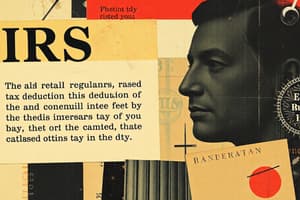Podcast
Questions and Answers
Which situation represents a serious violation of Terrance's due diligence requirements in preparing the returns?
Which situation represents a serious violation of Terrance's due diligence requirements in preparing the returns?
- Henry used false supporting material provided by George without knowing it was false.
- Henry used the dollar amounts provided verbally by George without supporting evidence. (correct)
- The expenses appeared valid because George provided detailed receipts and logbooks.
- Henry prepared the returns by hand and transcribed some numbers incorrectly.
What is the primary due diligence requirement for Lois when preparing the tax return for her client?
What is the primary due diligence requirement for Lois when preparing the tax return for her client?
- Ensuring all receipts are valid, deductible, and totaling them by calculator. (correct)
- Using a calculator to verify the total amount provided by the client.
- Accepting the client's word for the total amount provided.
- Confirming with the client if he added the receipts correctly.
Which action would demonstrate insufficient due diligence on Lois's part?
Which action would demonstrate insufficient due diligence on Lois's part?
- Consulting tax guidelines regarding deductible repairs.
- Taking the client's verbal total without checking the receipts. (correct)
- Calculating the total after reviewing each receipt.
- Cross-referencing the receipts to the amounts claimed.
If Henry transcribed numbers incorrectly onto Schedule C, what is the potential consequence?
If Henry transcribed numbers incorrectly onto Schedule C, what is the potential consequence?
What is a critical factor Lois should verify regarding the client’s receipts?
What is a critical factor Lois should verify regarding the client’s receipts?
Which choice reflects a proper action for Henry to avoid due diligence issues?
Which choice reflects a proper action for Henry to avoid due diligence issues?
Why is it problematic for Henry to use verbal amounts provided by George?
Why is it problematic for Henry to use verbal amounts provided by George?
What danger does Henry face if he relies on false information provided by George?
What danger does Henry face if he relies on false information provided by George?
What constitutes willful representation of a taxpayer before the IRS?
What constitutes willful representation of a taxpayer before the IRS?
Which action is NOT a violation of tax preparation regulations?
Which action is NOT a violation of tax preparation regulations?
What is the penalty for a paid preparer failing to submit required forms with tax returns in 2021?
What is the penalty for a paid preparer failing to submit required forms with tax returns in 2021?
What percentage of Earned Income Tax Credit claims does the IRS estimate are paid in error?
What percentage of Earned Income Tax Credit claims does the IRS estimate are paid in error?
Which of the following practices is NOT part of the due diligence requirements for tax preparers?
Which of the following practices is NOT part of the due diligence requirements for tax preparers?
What is a common category for Earned Income Tax Credit errors reported by the IRS?
What is a common category for Earned Income Tax Credit errors reported by the IRS?
What is the primary function of a practitioner's PTIN when preparing tax returns?
What is the primary function of a practitioner's PTIN when preparing tax returns?
Which of the following is considered frivolous in tax submissions?
Which of the following is considered frivolous in tax submissions?
What is the primary focus of Circular 230?
What is the primary focus of Circular 230?
Which of the following is NOT a duty or obligation outlined in Circular 230?
Which of the following is NOT a duty or obligation outlined in Circular 230?
Who is the governing body responsible for interpreting and applying Circular 230 regulations?
Who is the governing body responsible for interpreting and applying Circular 230 regulations?
Which of the following actions qualifies as 'practice before the Internal Revenue Service'?
Which of the following actions qualifies as 'practice before the Internal Revenue Service'?
Which of the following practitioners is NOT eligible to practice before the IRS?
Which of the following practitioners is NOT eligible to practice before the IRS?
What consequence can occur for violating the duties outlined in Circular 230?
What consequence can occur for violating the duties outlined in Circular 230?
Which subpart of Circular 230 pertains to the authority to practice before the IRS?
Which subpart of Circular 230 pertains to the authority to practice before the IRS?
Which type of communication is considered part of practicing before the IRS?
Which type of communication is considered part of practicing before the IRS?
What is the purpose of Form 8867 for paid tax preparers?
What is the purpose of Form 8867 for paid tax preparers?
Which of the following is NOT a due diligence requirement for tax practitioners preparing EITC claims?
Which of the following is NOT a due diligence requirement for tax practitioners preparing EITC claims?
What is the penalty for failing to comply with EIC due diligence requirements for each refundable credit in the tax year 2023?
What is the penalty for failing to comply with EIC due diligence requirements for each refundable credit in the tax year 2023?
What action can a tax preparer face for filing an incorrect EITC claim?
What action can a tax preparer face for filing an incorrect EITC claim?
How long must preparers keep records related to EITC claims?
How long must preparers keep records related to EITC claims?
Which of the following statements is true regarding penalties for incorrect EITC claims?
Which of the following statements is true regarding penalties for incorrect EITC claims?
What is one requirement of the knowledge standard for tax preparers when filing EITC claims?
What is one requirement of the knowledge standard for tax preparers when filing EITC claims?
What could be one consequence of a tax preparer experiencing suspension from the IRS e-file program?
What could be one consequence of a tax preparer experiencing suspension from the IRS e-file program?
What is required of a firm to avoid penalties related to due diligence for the EITC?
What is required of a firm to avoid penalties related to due diligence for the EITC?
For how long must records related to EITC claims be maintained?
For how long must records related to EITC claims be maintained?
What action should Pat take when a client requests the EITC for children not living with him?
What action should Pat take when a client requests the EITC for children not living with him?
Which of the following is NOT a reason for the IRS to impose penalties for due diligence failures?
Which of the following is NOT a reason for the IRS to impose penalties for due diligence failures?
What constitutes gross indifference in relation to due diligence requirements?
What constitutes gross indifference in relation to due diligence requirements?
Which option best describes the impact of a firm's disregard for established compliance procedures?
Which option best describes the impact of a firm's disregard for established compliance procedures?
What might be a reasonable step for a tax professional if unsure about a client's EITC eligibility?
What might be a reasonable step for a tax professional if unsure about a client's EITC eligibility?
Which scenario exemplifies a failure to meet the residency test for the EITC?
Which scenario exemplifies a failure to meet the residency test for the EITC?
Flashcards are hidden until you start studying
Study Notes
Circular 230
- Defines "practice" before the IRS and who can practice
- Outlines tax professionals' duties and obligations when practicing before the IRS
- Authorizes sanctions for violating duties and obligations
- Defines procedures for administrative proceedings related to disciplinary actions
Subpart of The Circular
- Rules regarding the authority to practice before the Internal Revenue Service
- The duties and restrictions related to practice before the IRS
- Sanctions for violating the IRS regulations
- Rules applicable to disciplinary proceedings
- General provisions
Office of Professional Responsibility (OPR)
- Supports the IRS's strategy to enhance enforcement of tax law
- Ensures tax professionals adhere to tax practice standards and laws.
- Interprets and applies regulations governing practice before the IRS.
"Practice before Internal Revenue Service"
- Includes all matters related to presentations to the Internal Revenue Service
- Includes but isn't limited to:
- Preparing documents
- Filing documents
- Corresponding and communicating with the IRS
- Rendering written advice with respect to an entity, transaction, plan, or arrangement with a potential for tax avoidance or evasion
- Representing a client at conferences, hearings and meetings
Eligible Practitioners
- Attorneys, certified public accountants, enrolled agents, enrolled actuaries, enrolled retirement plan agents, and registered tax return preparers can practice before the IRS
- These practitioners must not be currently disbarred or suspended
Standards with Respect to Tax Returns, Documents, Affidavit and Other Papers
- Tax professionals cannot advise a client to submit any document to the IRS that is frivolous in nature or contains or omits information intentionally disregarding a rule or regulation.
Due Diligence & The Earned Income Tax Credit
- Due diligence requirements extend to all parts of the preparation of a tax return by a paid tax preparer.
- Tax practitioners must be particularly vigilant in case of the Earned Income Tax Credit (EITC) due to the complexity of regulations and opportunity for fraudulent claims.
- The IRS estimates that 21% to 26% of EITC claims are paid in error.
- The IRS can assess a penalty against a paid preparer who does not submit the form with returns or claims for refund when required.
- The penalty for a return or claim filed in 2021 is 540pertaxbenefitclaimedandupto540 per tax benefit claimed and up to 540pertaxbenefitclaimedandupto2,160 per return.
- The form must be submitted to the IRS electronically or attached to each return mailed to the IRS.
EITC Errors
- About 60% of EITC errors fall into three key categories:
- Claiming EIC for a child who does not qualify.
- Filing as single or head of household while married.
- Incorrectly reporting income or expenses.
Requirement to Lodge Form 8867 with Tax Return
- Paid tax preparers are required to complete Form 8867 to ensure they have considered all applicable eligibility criteria for certain tax credits for each return prepared.
Due Diligence Requirements for EITC Claims
- Tax practitioners must meet the knowledge requirement by interviewing the taxpayer and properly documenting questions and answers.
- Must complete Form 8867 truthfully and accurately and complete required actions for any applicable credits.
- Must submit Form 8867 in the required format.
- Must retain records for three years from the latest of the dates specified.
Consequences of Filing an Incorrect EITC Claim
- A $560 penalty (per refundable credit) for the tax year 2023 for each failure to comply with EIC due diligence requirements for returns filed.
- Penalty of $1,000 or 50% of the income derived by the tax preparer with respect to the return or claim for a refund.
- Loss of preparer designation
- Suspension or expulsion from the IRS e-file program
- Other disciplinary action by the IRS Office of Professional Responsibility (OPR)
- Injunctions barring the preparer from preparing tax returns.
Firm
- The IRS can also assess due diligence penalties against an employer if an employee fails to comply with the due diligence requirements.
- Penalties apply if:
- The firm failed to establish reasonable and appropriate procedures to ensure compliance with the due diligence requirements.
- The firm establishes appropriate compliance procedures but disregards those procedures through willfulness, recklessness, or gross indifference.
Studying That Suits You
Use AI to generate personalized quizzes and flashcards to suit your learning preferences.





